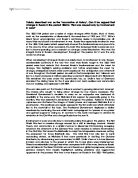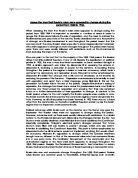One can also point out that Russia’s failure in war led to growing discontent amongst the masses who sought to bring about change by any means necessary. The Provisional Government’s decision to carry on an unpopular war destroyed its credibility in the same way that Nicholas II lost support by personally going to the frontline. War was essential to revolutions throughout the period. Failure in the Russo Japanese war shattered the image of Tsarist power and exposed Nicholas II as a poor leader - this weakness was again exposed in the first world war which ultimately led to the downfall of the Tsars. The Provisional Government displayed a similar weakness by continuing the war whilst Lenin campaigned for ‘peace at any price’ and gained support in doing so. In contrast to this, Lenin managed to defend his revolution in the Civil War and change Russia how he saw fit.
Involvement in wars was also key to domestic policy throughout the period. The First World War led to massive change caused by a shift in ideology towards Marxist theory and communism, in a similar manner to Alexander II introducing sweeping reforms in the aftermath of the Crimean War. Lenin needed to defend his revolution in the Civil War, this forced the Bolsheviks to adopt brutal repressive measures, setting the precedent for future Bolshevik rule. The Civil War had also led to Lenin conceding defeat, as Nicholas II had done previously in drafting the October Manifesto, by abandoning war communism for NEP. Stalin’s fear of a future German invasion was also key to the speed in which the 5 year plans were implemented. There is considerable change here when compared with other wars, because Russia was victorious in the Great Patriotic war and became a global superpower, whereas previous defeats had merely highlighted existing problems and aggravated opponents in the process. War had a vast impact on Russia in the 1855-1964 period, and involvement in wars had a significant impact on the development of the Russian state.
Throughout the period, the Tsarist and Communist regimes shared a common goal, to industrialise. This shared aim was set about in different ways - Stolypin and Stalin in particular had seen the need to boost agriculture in order to support heavy industrialisation, whereas the policies of Witte and Lenin were less focused on this issue. Whereas Stalin’s main motivation could be traced back to war, Stolypin and Witte appeared to have more concern for the masses when implementing their policy. This was also the case under Khrushchev, who often had the best of intentions when implementing policies such as the Virgin Lands scheme. Despite war highlighting the problems Russia needed to address, it was not the only motivational factor in the development of the Russian state.
War had showed up Russia’s need to speed up the process and affected domestic policy in order to make sure this was a realistic target. Stalin’s speech in 1931 acknowledged that Russia was ‘100 years behind the West’, Nicholas II’s Russia received increased foreign loans from the Entente in order to boost their economy, and the heavy spending seen under Khrushchev’s tenure was also with an underlying aim of competing with their Cold War rivals, in particular the Americans. Despite war undoubtedly being a locomotive of change for industrialisation, it was not the only factor in the development of the Russian state. Witte’s Great Spurt showed some concern for the workers and agrarian reforms as seen under Khrushchev and Stolypin also displayed signs of intent.
Opposition to rulers can usually trace their roots back to Russia’s involvement within war. Khrushchev’s removal by the Central Committee was in part down to Cold War policy failure, just as Nicholas II before him had been removed due to poor leadership following Russia’s embarrassment in the First World War. The Provisional Government had also lost a vast amount of support by continuing the First World War, whilst Lenin campaigned for a more attractive alternative, peace. Alexander II’s assassination by the People’s Will was because they did not agree with his reforms, which were introduced following the Crimean War, which displays the considerable continuity throughout the period in war aggravating opponents.
Repression was used to limit this opposition, in particular through the secret police which remained a consistent feature of Russian rule. The Cheka heavily intensified aspects of repression seen under the 3rd section and Okhrana, and the KGB would continue to do so. Concessions brought about by the rulers as a result of war were also met with repression, such as Stolypin’s necktie and in particular the unprecedented terror seen under Stalin, who believed that ‘’death is the answer to all problems’’. The success of opponents was in part due to war, as best demonstrated by the February and October revolutions, however well timed reforms, shown by war to be badly needed, limited their effectiveness. Repression was used to rulers to keep their grip on power and maintain autocracy, not because of war.
War was the integral factor in Russian development throughout the period. The First World War in particular brought about a complete shift in ideology and the creation of the world’s first communist state, but also paved the way for the fast industrialisation of Russia and a shift in focus from agriculture to industry. War had repeatedly shown Russia as a backward, weak nation however victory in 1945 had established Russia as a global superpower. Despite its obvious importance, war was not the only locomotive of change within Russia during the 1855-1964 period. Change in Russia was not solely down to involvement in wars.







